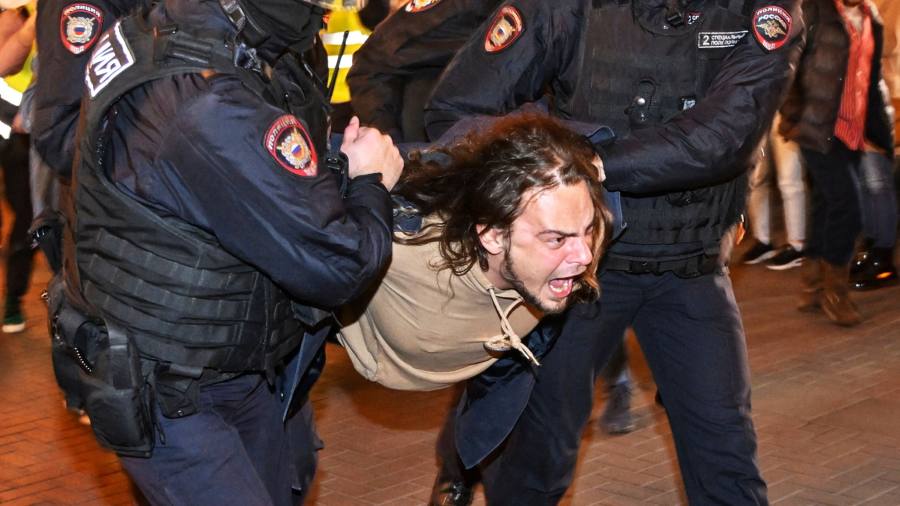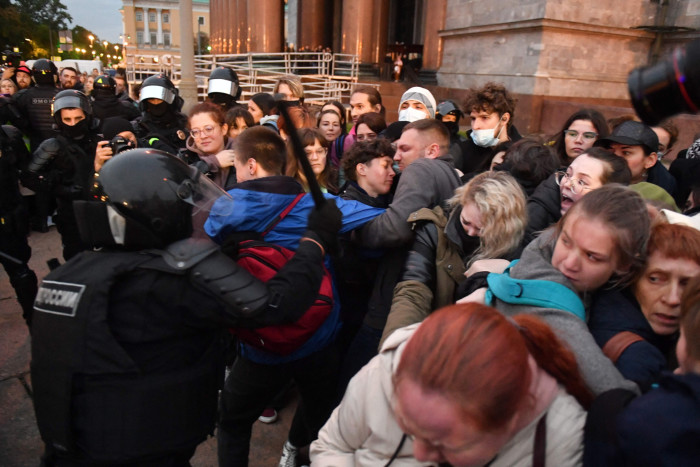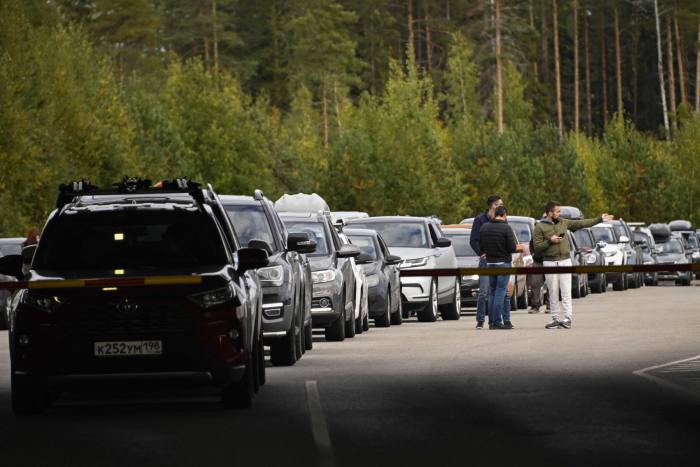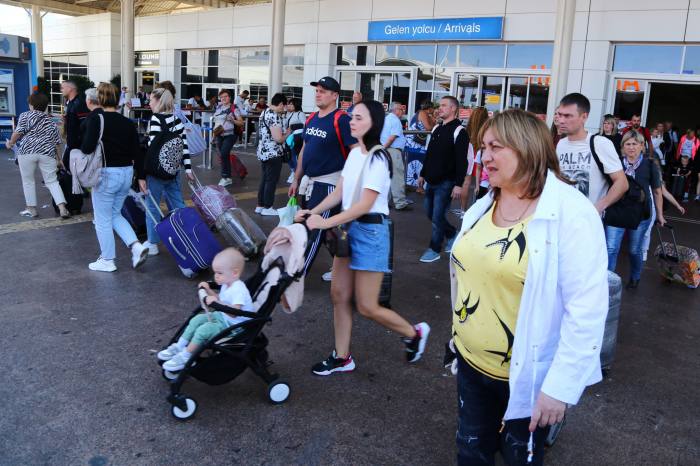
After Vladimir Putin ordered the invasion of Ukraine in February, Nadezhda urged her son to flee the country, fearful he would be conscripted into the Russian army.
He ignored her advice. Now, days after the Russian president announced a “partial” mobilisation to add as many as 300,000 men to the military, he is desperately seeking a way out over the border to avoid fighting against his cousin, who serves in Ukraine’s armed forces.
“This is a war of brother against brother. My son is supposed to go to war against my nephew,” said Nadezhda, 64, whose full name the Financial Times has chosen not to disclose. “It just looks like they’re going to pick everyone up. Everyone will get snatched off the street.”
Putin’s decision to bolster Russia’s army with its reserves has brought the war close to home for people such as Nadezhda’s son, who had managed to largely carry on living as before for the first six months of the war.
The FT spoke to eight people who had been called up to the Russian army, feared they soon would be, or had close relatives who faced conscription. Their names are partially or fully withheld because they could face up to 15 years in prison for spreading “fake news” about the military.
In interviews, they painted a picture of a population fearful of being used as cannon fodder — and possibly facing a broader draft than Putin announced.
The mobilisation announcement on Wednesday prompted widespread panic among Russia’s population and sporadic protests across the country.
It shattered an unspoken social contract in which the public tacitly supported the invasion, branded a “special military operation” by Putin, as long as the fighting stayed far away from daily life.
“Everyone is very scared now,” said Danil, 22. “If you could find a way to ignore it before, now there’s no way.”
Flights out of many major Russian cities for the coming days sold out fast and long queues of cars have appeared at Russia’s land borders. Human rights lawyers reported receiving thousands of requests for help from people who fear being called up.
Though the Kremlin insists the mobilisation is only “partial” — limited to those who’ve served in the armed forces before and have combat experience — analysts and lawyers say the text of the decree has been left vague so that authorities can scale up the recruitment drive.
“Mobilisation is called ‘partial’, but no parameters of this partiality, neither geographical, nor in terms of criteria, are specified,” Ekaterina Schulmann, a Russian political scientist, wrote on her social media page. “According to this text, anyone can be drafted, except for workers of the military-industrial complex.”

One paragraph of the decree was redacted, the numbered list of rulings skipping from point six to eight. The hidden ruling, the Kremlin’s spokesman later explained, referred to the total number of Russians that could be conscripted. This information, he said, could not be disclosed, though he repeated the 300,000 figure.
In some parts of the country, particularly in Russia’s more remote and poorer regions, military authorities have started conscripting men of fighting age regardless of their background, according to activists and direct witnesses.
“It doesn’t matter how many children you have, whether you have combat experience, or whether you served in the army or not. Conscription notices are being handed out to everyone,” said one woman in the far eastern province of Buryatia, a region with a large ethnic minority population that has already suffered significant losses in the war.
Her husband, a father of five with no military experience, received a phone call on Wednesday evening, hours after mobilisation was announced, saying officials were coming to hand him his conscription papers. In another recorded call, which the FT was able to listen to, her husband was given more instructions: he was to come to a meeting point by 4am that night, and by 2pm would be on a train to a military base.
The couple switched off their phones and left the city. Soon, however, they found themselves running out of options.
Conscription officers had already come looking for them and checked for them inside their house, friends said. Their home village was not safe either: relatives warned them that men had been rounded up there that night.
They thought of trying to leave Russia by driving from Buryatia into Mongolia but feared they were too late. Friends waiting in the massive queue of cars told her conscription officers had begun working the line.
“It seems crossing the border is no longer an option for us,” she said. As she spoke, army trucks with the word “people” painted on the side — used to transport recruits — sped past their car. “It’s going to be very hard to hide,” she said, her voice ringing with panic.

On the Telegram messenger app, tens of thousands of people have joined mutual support groups, sharing tips about the situation on the land borders and whether border police were letting men of fighting age leave.
According to Russian law, once mobilisation has begun, men on the military roll are not allowed to leave their area of residence, let alone their country. But so far, this has not been clearly enforced.
Videos began to circulate on social media on Thursday showing scenes from across Russia of young and middle-aged men bidding farewell to their families and boarding conscription buses.
Over a thousand people were detained at protests that took place in several Russian cities on Wednesday evening.
On Moscow’s Arbat street, protesters chanted for Putin to go to the trenches himself before police violently dispersed them. At least 1,386 people were arrested at protests in 38 cities, according to OVD-Info, an independent monitor.
“This is the last dying breath of the system as it collapses, the final death throes. It’s trying to show that it’s still in control, but this is an illusion,” said Egor, a 38-year-old protester.
In addition to the sentences of up to 15 years in prison protesters already face for “discrediting the Russian armed forces”, some were handed draft notices by police immediately after their arrest, OVD-Info said.

“Everyone is lying to everyone about everything all the time. And these lies are getting bigger and bigger and bigger up to the point where you need huge resources for people to believe in this huge illusion,” Egor said.
“They promised us a better life, nobody will touch you, everything will be fine. And now they are taking your children off to die,” he added.
Dmitry Peskov, Putin’s spokesman, said reports of Russians fleeing the country en masse to avoid the draft were “very much exaggerated”. Peskov said that police were within their rights to hand people draft notices at police stations, apparently confirming the practice.
Vladimir Tsmilyansky, a spokesman for Russia’s general staff, said that 10,000 people had come to recruitment offices without a summons on Thursday. Russia’s priority was to call up men with experience using rifles, tanks, and artillery, as well as drivers and mechanics, Tsmilyansky said.
Those on the list of reserve forces are the most at risk for conscription. In the Siberian city of Irkutsk, one reservist told the FT he had been called up for training pre-emptively, four days before mobilisation was even announced.
Others on the list said they regretted not leaving while they still had the chance. A 35-year-old reservist in another part of Russia said that he was shocked by the outbreak of war and had considered leaving, but decided his family could not afford to go.
Now it felt too late, he said. “It was all done at such lightning speed that tickets were already all sold out or had gone up fourfold in price.”
“I’m under no illusions,” he added about what could happen to him if he gets sent to the frontline. “War is always evil.”